Interview: Chetan Ramchurn, Entrepreneur

‘Our mainstream parties offer a democratic façade but the truth is simple,
the leader is the one with all the power, no one else can wear the crown’
‘The government is trying the impossible equation of simultaneously pleasing the haves and the have-nots… A devaluation of the Mauritian rupee against the dollar is what we are staring at’
Chetan Ramchurn, a young entrepreneur, makes as usual a refreshing and revealing analysis of the situation in the country post November 2019. As regards the ‘rapport de forces’ on the political front, he says that although ‘the opposition parties have somehow managed to keep a cohesive front on the fairness of the last polls, at least for the time being, the MSM has a long-tested recipe for success and has the upper hand now’. Can the situation be reversed? ‘The opposing factions know that they have to get their houses in order first. The opposition has to groom its new members and win inch by inch every single seat captured by the MSM. It is a Sisyphean task that awaits them…’ He also makes interesting comments on the issue of patronage appointments, party leadership, the economic situation, etc. Read on:
Mauritius Times: 15th February 2020 marked the first 100 days of the MSM-ML government. Nothing major has happened during that period, except for the Presidential Address outlining the Government’s programme covering the period 2020 to 2024, and the various appointments in different public institutions. What are your impressions of these first 100 days?
Chetan Ramchurn: There is an air of ‘business as usual’ that the present Government wants to instil. And indeed, not much has changed as evidenced by the level demonstrated in some maiden speeches. The Premier does not seem to have been invigorated following his win at the general elections, choosing to keep a subdued demeanour. His meagre 37% has been time and again reminded to him and the opposition parties have somehow managed to keep a cohesive front on the fairness of the last polls, at least for the time being. There should be no doubt in our minds though, the MSM has a long-tested recipe for success and has the upper hand now.
The first few months of any new mandate are usually spent distributing key positions to candidates who have lost and close collaborators. Those in power seem to be more patient this time around, taking the time to validate each and every one of them. We would hope that the independence of the Bank of Mauritius (BOM) will not be toyed with.
We have had some courageous Governors who remained unwavering in the face of various lobbies. Bheenick was one of them, unafraid to take on the ‘banksters’ and standing for a reasonably valued rupee against a Minister of Finance that advocated devaluation. That Rs 18 billion were transferred from the Special Reserves for debt repayment without any hurdle should be of concern to us. Of even greater concern for the country is the fact that those that have been touted as potential replacements at the BOM are even closer to those wielding power.
There are some successes as well. The tramway, most prominent among them, is up and running. Will it be viable financially? Will it reduce traffic jams and render employees more productive? We have yet to know. As under successive governments, the gifts to the historic bourgeoisie were quick to be announced: a new road linking La Vigie to Flic-en-Flac will boost the value of real estate ventures and keep the financers happy.
We should be particularly concerned about the outcome of the “Assises de l’environnement” which is a laudable initiative but whose success can only be gauged through the application of strong measures not only aimed at citizens, which seem to be privileged, but also against carbon emissions. As at 2018, 40.2% of electricity was generated from coal, 39% from diesel and fuel oil with the remaining 20.7% produced from renewable sources. The CEB should spearhead the movement towards renewable sources instead of waiting for existing and new IPPs to do so. Any responsible country would seek to be independent on the energy front so that it does not have to kowtow to private sector interests. This has not been the case in Mauritius.
* As regards the patronage appointments made by the current Government, to be fair all governments have to date made sure they place their trusted men in strategic posts and none have shown any demonstrable interest to change the way things are done. In any case none of these appointments have ever been challenged. What’s wrong with that?
There were some strong reservations about the new Speaker of the House from the MMM ranks and that no opposition members albeit the Leader of the Opposition participated in the swearing-in ceremony of the new President does say a lot.
The opposing factions know that they have to get their houses in order first. The need for an aggiornamento is crucial and will have to be carried out intelligently without strengthening the present government. They face an uphill battle and attacking the government on every single nomination will not be beneficial to them. You will note that the democratic participation of most citizens is limited to one voting expedition every five years. To adopt a ‘coup d’état permanent’ strategy would be counterproductive.
The opposition has to groom its new members and win inch by inch every single seat captured by the MSM. It is a Sisyphean task that awaits them. The MSM was intelligent enough to shed many of the unpalatable figures that were scandal ridden prior to the elections. The other parties would do well to adopt a similar position. They have to be immaculate when it comes to their reputation.
* The fact of the matter, it would seem, is that so long as the going is good, the people may not really be bothered about such things as political appointments or patronage appointments. The going has been good since before the last elections, but how long will this last?
It is not easy as La Boétie’s « Soyez résolus de ne servir plus et vous voilà libres ! » Most are aloof to the economic situation and the level of public debt. Neither are they concerned about the devaluation of the rupee nor are they worried about the fiscal gifts offered to the rich. That has been the case for decades now.
The system is tilted towards the powerful and everyone is out to get the crumbles, never mind a slice of the pie. People have fallen down the rabbit hole and seem entrapped in a maze. This apathy is not particular to Mauritius and can be witnessed across the world. The mind-numbing mantra is simple: Keep them in a perpetual sense of amazement.
Napoléon expressed it in succint terms, “Il faut des fêtes bruyantes aux populations, les sots aiment le bruit, et la multitude c’est les sots.” Onfray in his ‘Grandeur du petit peuple’ gives the other side of the coin of this system : « Or, une fois le spectacle terminé, ce peuple sans visage continue à souffrir et à trimer, à travailler et à peiner pour joindre les deux bouts, c’est lui qui se trouve en première ligne de cette guerre menée contre les gens simples par les ‘élites’, comme il est dit, qui les sacrifient pour une assiette de lentilles… »
There is no such thing as a free lunch in this world. At some point, our debts will have to be repaid. Are we going lose our assets to foreign powers and lose our independence? There is great irresponsibility in being generous with money we do not have. What is cringeworthy is that the popular measures come at a hefty cost but the Government is not courageous enough to opt for progressive taxes.
In short, the government is trying the impossible equation of simultaneously pleasing the haves and the have-nots. A devaluation of the Mauritian rupee against the dollar is what we are staring at.
* What are your major worries for the country at the beginning of 2020, that is in the first year of the Government’s mandate?
The most pressing concern remains the education sector with the shift to the 5-credits requirement being a potential generation wrecker. Teeluck Bhuwanee in his article for the Mauritius Times rightly identifies the risk of creating a lost generation:
“The 5 credits requirement crisis could create a lost generation of children whose life chances will have been irreparably damaged by a failure of the state to protect their right to education. Out of the 13,000 that have failed to get the required credits to go to HSC, some 1000 will get admitted to Polytechnics and a few may repeat their SC. That still leaves some 7000 that will get no further schooling.”
Having lectured before, I can tell you all about the late bloomers – students who have done poorly at SC and HSC levels who turn out to be strong undergraduate students. We should not dismiss them at such a young stage of their lives, but be patient. My other concern is rote learning. What do we end up producing? Patented yes-men? People who will put financial success beyond all other considerations? It is a worrying trend.
Another major apprehension is that government would continue spending extravagantly thereby piling debt on further generations without having any idea on which new projects would be worthwhile to ensure additional revenue.
* We’ll get to know more about what the Government plans to do about the economy from the next Budget Speech. Economists are saying that its room for manoeuvre is rather limited given the high level of public debt, low tax takes, the financing of its popular social measures, etc, but the Government does not appear unduly worried. What’s your take on that?
We expect much more from a full-time Minister of Finance, Economic Planning and Development. He has not been very vocal about the paths he intends to follow and one of his first measures was baffling. However, in December of last year, he thought it wise to associate his Ministry with Lottotech so that funds can be raised for people afflicted by natural disasters.
Would more progressive taxes not be a more just solution than condoning gambling which impacts the poor households in a most damning way? Lest we forget gambling can be an addiction. It was poorly thought even more so for someone who, I believe, has been working to alleviate the burden on those at the lower rungs of the economic ladder.
An important issue that he has to address is the dwindling savings rate. Sanjay Jagatsingh evaluates the loss in savings between 2006 and 2018 “at Rs 569.7bn whereas the total FDI for the same period is Rs188.9bn.” He further avers “That’s Rs 381bn of net savings missing which could have been used to put Mauritius on higher levels of development by building new fields of activities that are more respectful of the environment and our national heritage.” New incentives to spur savings would be more than welcome. Another fake lodestar is the Doing Business ranking, the correlation between how well we do and growth achieved is insignificant. Why is he paying so much attention to it?
The Government’s relaxed stance could mean that it has some tricks up its sleeve. It could be the selling of our national assets, a line of credit from an imperial power in exchange for additional clout in the region, and we do have a formidable ambassador in Soodhun that could leverage his excellent relationship with the House of Saud to bail us out.
* At one time Mauritius had been able to transform itself beyond what was once thought possible. We have achieved this in the past with economic diversification. Now the ambition is to become a high-income, innovation-led economy. Can we bring about another transformation again?
According to me, there are more pressing concerns than reaching the USD 12,475 per year threshold. What would the high-income tag bring us if inequality between rich and poor is ever widening?
Our economic success has been built on efficient administration, political stability and a strong regulatory environment (Frankel 2010). We no longer offer that with regulators which are bastions of political nominees. We have witnessed the mess surrounding the licensing of companies attached to Alvaro Sobrinho. Is it befitting of a serious jurisdiction to let politicians interfere in the allocation of licences? Firefighting seems to be the norm in many of our regulating bodies.
Moreover, the economic transformation we are presently pursuing panders to the elite with an overt focus on real estate ventures whereas in the past the transformation was one that took account of the ‘political, human, institutional and economic realities and constraints of the time’ (Ramdoo 2014). Planning is central if we want to progress. How many times have we seen hotchpotch solutions being implemented merely because highly paid advisers found nothing better than to ape what has been adopted elsewhere? Often at a steep price for the country.
* Political parties are in charge of the implementation of the agenda for the transformation we spoke about in the preceding question. One no longer has the impression of politics being done in Mauritius the way it was done earlier, when the political leaders of the Independence generation worked in real earnest to change society into something better than what they had seen before. Does the present generation inspire confidence?
We have had some great leaders to steer our country away from the obvious pitfalls back then. I believe that there are men and women of value that think of the best interests of our country among the present generation. But many have been reduced to mere puppets serving their leaders, doing photo ops, trying very hard to sound cool and trendy.
Back then, the candidates were some of the best minds of the era: Seeneevassen, SSR, Kher Jagatsingh, Ringadoo, Walter, etc., but not only. There were some irregularities back then as well but those at the head knew that the interests of the country trumped any others.
Today’s selection seems to be the result of a casting based on Facebook following and media presence. What is disappointing is the ability to change colours within short timeframes. Former MMM members so adamant not to be mere followers of Berenger seem to be happy to acquiesce to whatever the MSM requires from them. There is nothing surprising in that for all mainstream parties have been hollowed out ideologically and shifting from one to another poses no issue.
The danger of a “centrisme mou” is that the state is viewed merely as a facilitator, something of a welcoming doormat for private sector interests. The colour on the flag does not matter – whether orange, red or blue.
* We spoke about the Government’s first 100 days earlier. That question could as well be put to the Opposition, which incidentally has been in the news mostly for the wrong reasons during that same period. What’s your opinion on that?
The night of the long knives was to be expected following the general elections results. Despite the strife within factions, the relationship between different parties has improved. This could quickly change such is the lure of power and an offer to join the government.
Our mainstream parties offer a democratic façade but the truth is simple, the leader is the one with all the power. Elevated to the status of God or King, the Leader more often than not chooses his ward as successor. No one else can wear the crown. The Labour Party’s history is rich with great leaders that have carried the torch be it Curé, Anquetil, Rozemont and SSR.
No one is irreplaceable and the best way to deal with the leadership issue is by adopting transparency. Let primaries be open to all Mauritian citizens and let them decide who the best at representing them is. For long, what differentiated the MMM and the Labour Party from the MSM was the freedom of expression given to its members and the view that they were not a family enterprise. If the differences are annihilated, they might as well cease to exist.
* It appears there is presently a morale problem within the opposition ranks, what with the results of the last general elections. J Chan Low was saying to this paper last week that there is more to the defeat of the opposition parties than the alleged electoral frauds. What do you think?
Certainly, it can be attributed to a number of other factors but that does not negate the right of the different parties to question the validity of the elections. There were way too many tactical errors in the campaign. No disruption could be made to the existing narrative sold by those in office. They had worked very hard at destroying Navin Ramgoolam’s image and had considerably hyped the hefty tramway, papal visit and Island Games.
Added to that, the enticing Rs 13,500 pension over the next five years swayed the voters in MSM’s favour. When the MMM and the MLP decided to match the pension figure of the MSM, they were treading on a terrain where the Jugnauths had first-mover advantage. Moreover, they matched the MSM’s artificiality with their own brand of make-believe.
* Do you see a credible alternative in the opposition with its present functioning and leadership structures?
We live in an epoch where an unknown figure can make it to the top of the hill in less than five years. It happened in France with Macron. There are a number of young talents that look promising and new ones will probably join in eventually. But it is near impossible to be heard in a system that is rigged in favour of the leader.
One way of ensuring that it happens is by opening the party to new members. Those that are disgusted with politics as it is presently practised would be more likely to participate. Then only can change happen. St Exupery’s « Si tu diffères de moi, mon frère, loin de me léser, tu m’enrichis » should apply or inspire at least: a political party is not a fan club but an agora where different views battle each other.
* But putting in place a higher internal democratisation process which will allow for internal debates, clear rules of governance and transparent operations… that’s a very tall order for the traditional parties, don’t you think so?
Almost 52 years since we achieved independence and we have yet to render political financing transparent. Democratisation seems very difficult to apply such is the level of rot within the parties. But should it really surprise us? Political parties are not that far-off from what our society is. Most people join parties, see that almost everyone around them is happy being a lackey and join the batch of followers.
Is it not the same sight at our workplaces? Is hypocrisy not prevalent with yes-men that go on full Che Guevara mode once ousted from power? That we have accepted hypocrisy and obsequiousness within party politics should not surprise us. It is unlikely to change in the short term and certainly not without great efforts from the progressive camp. Fewer echoes and more voices.
* Published in print edition on 21 February 2020






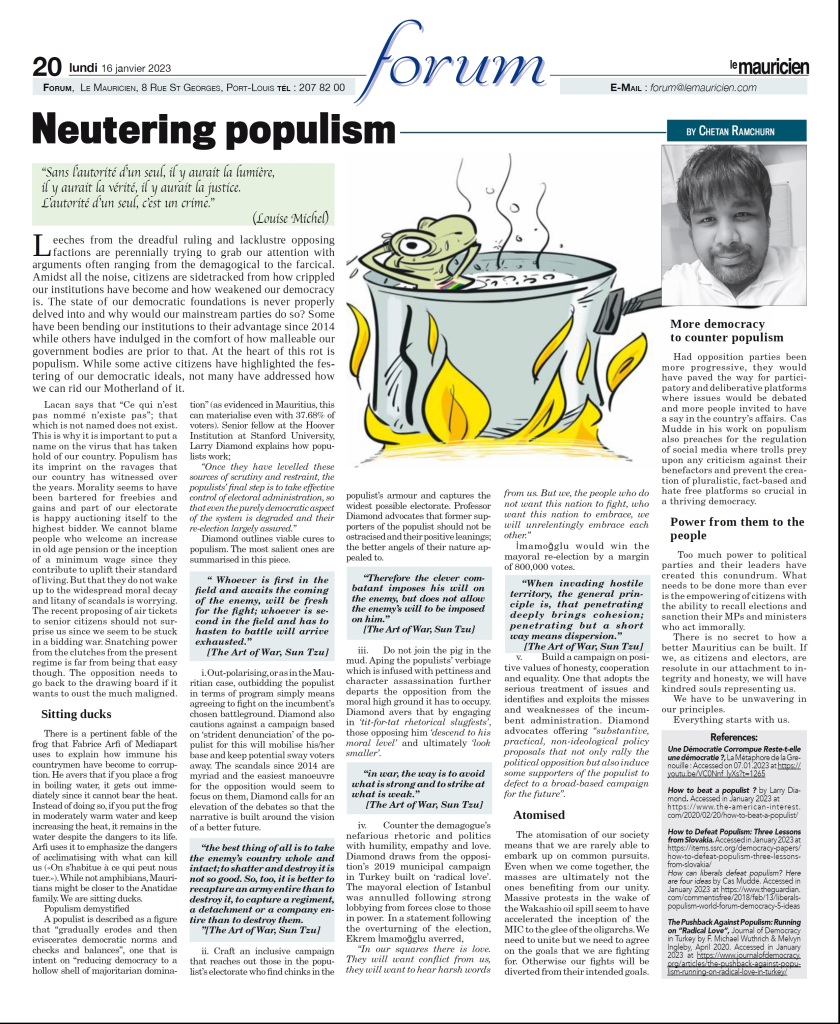









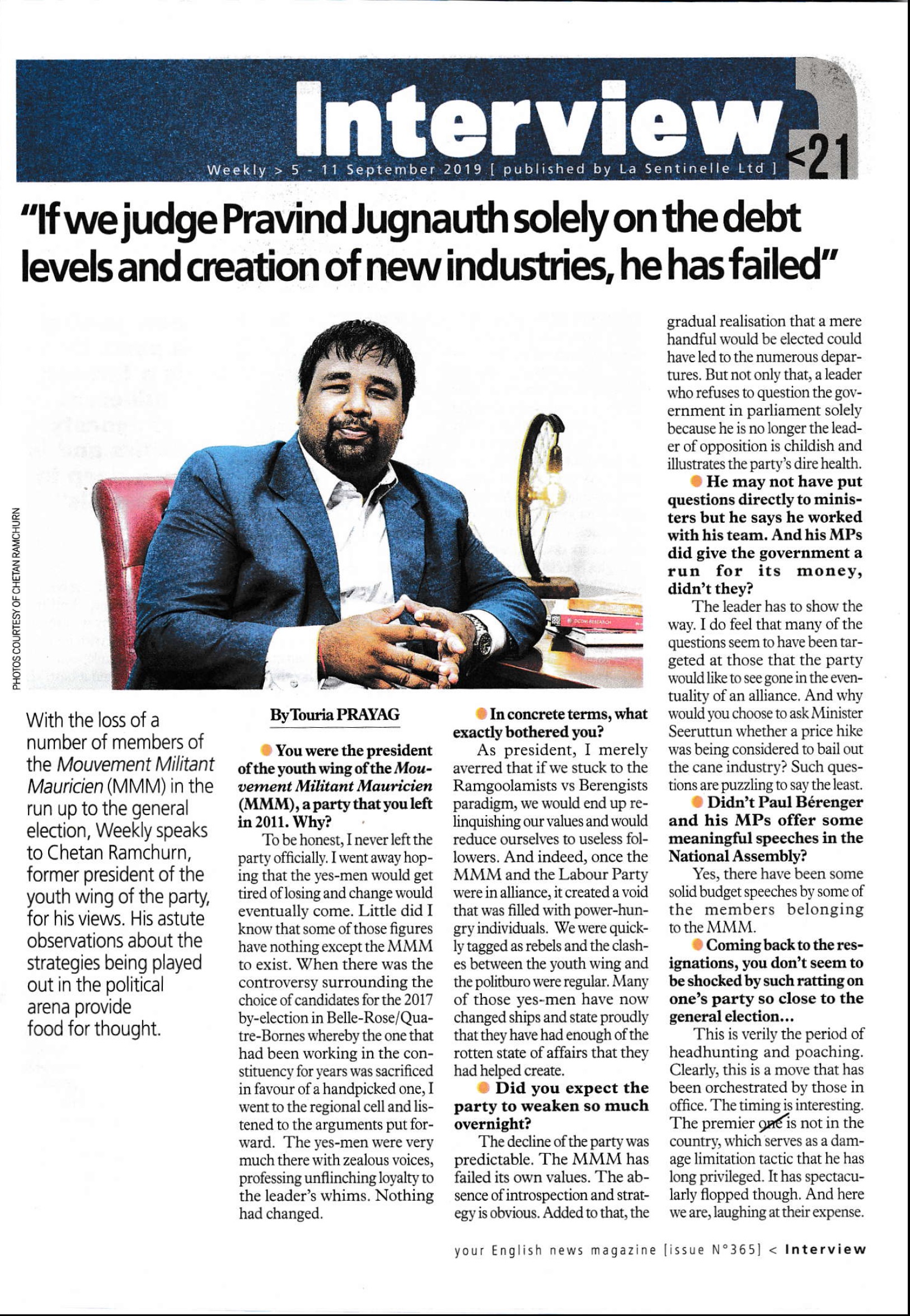
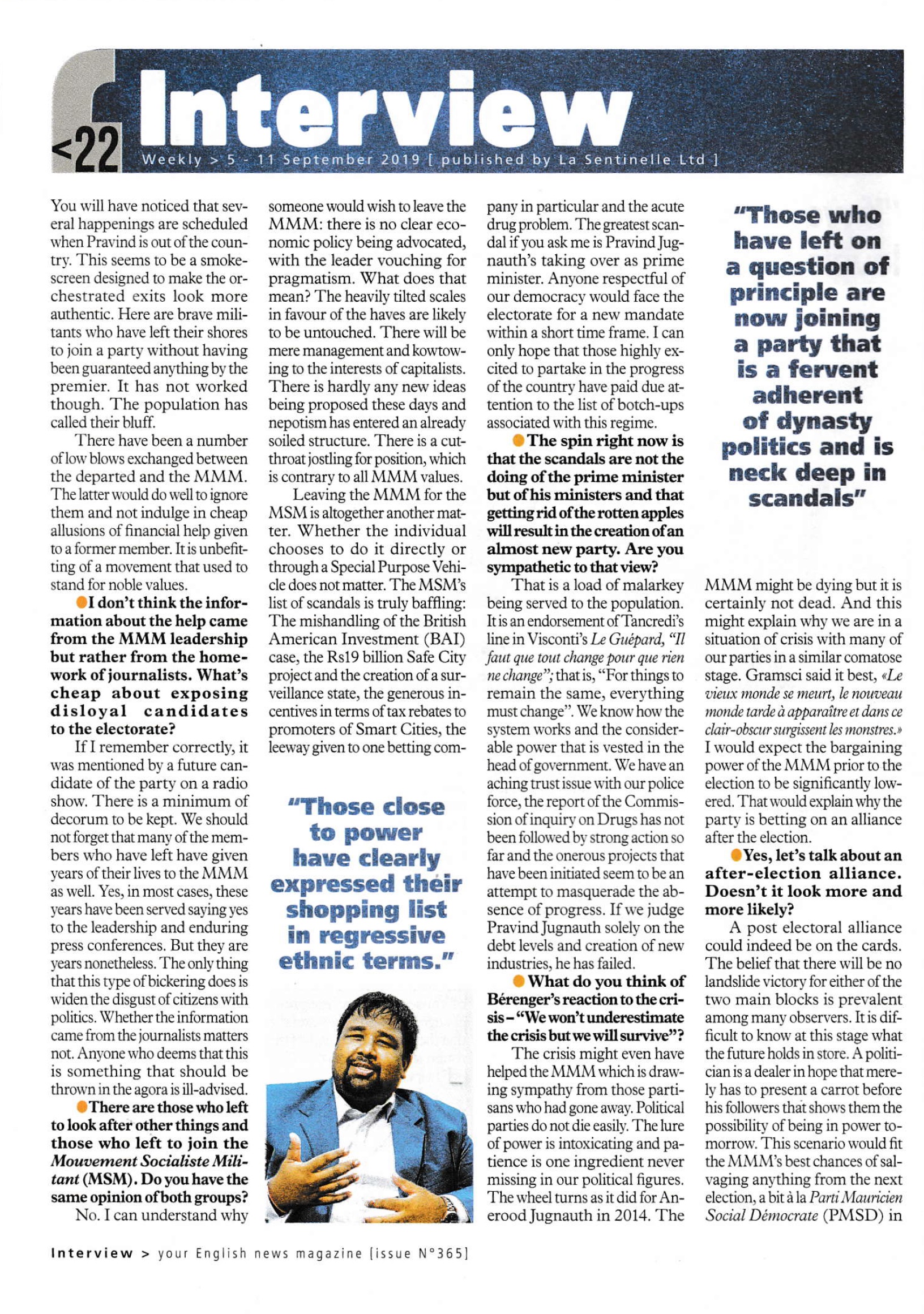
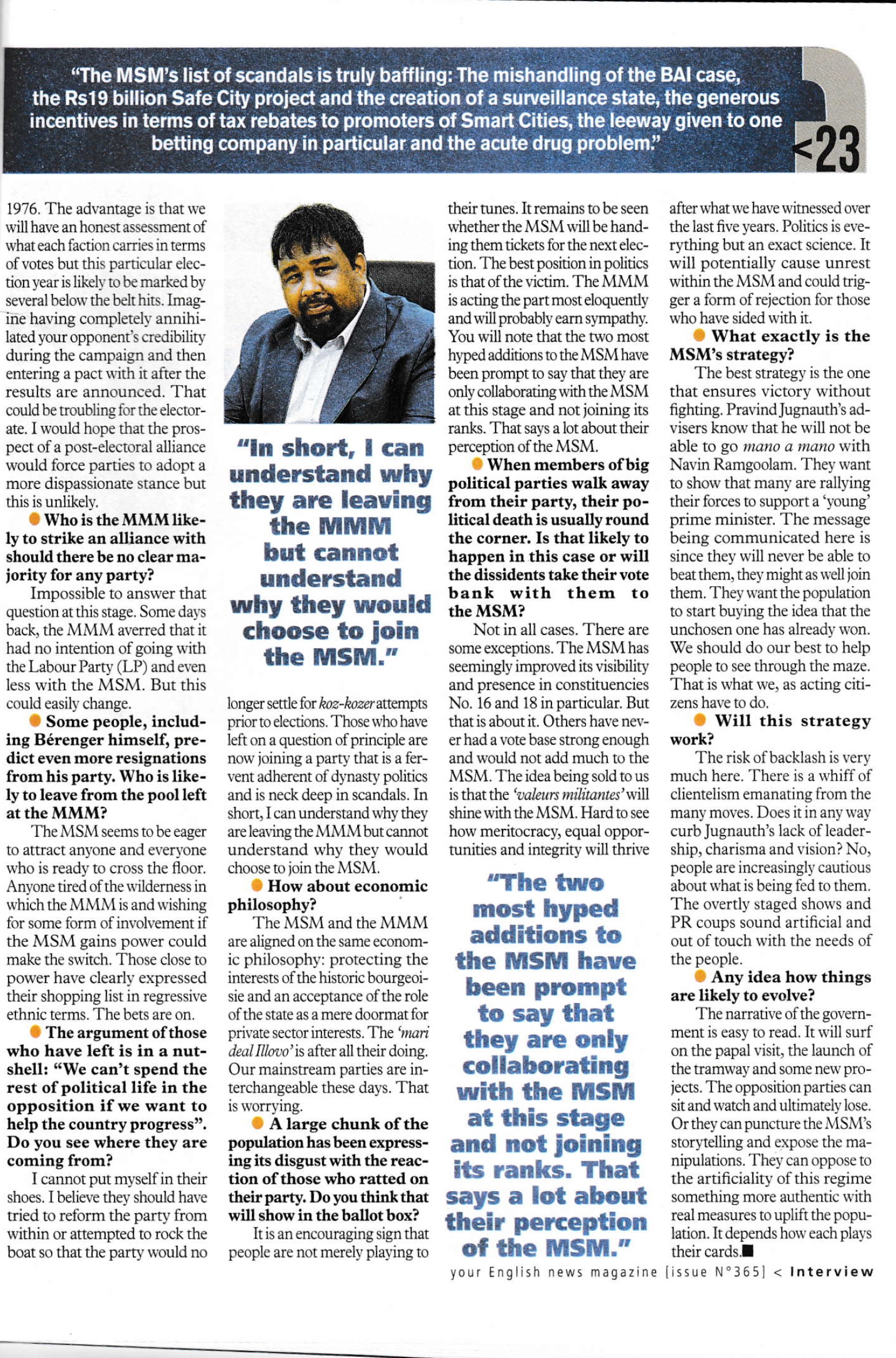 L’Express Weekly 1
L’Express Weekly 1

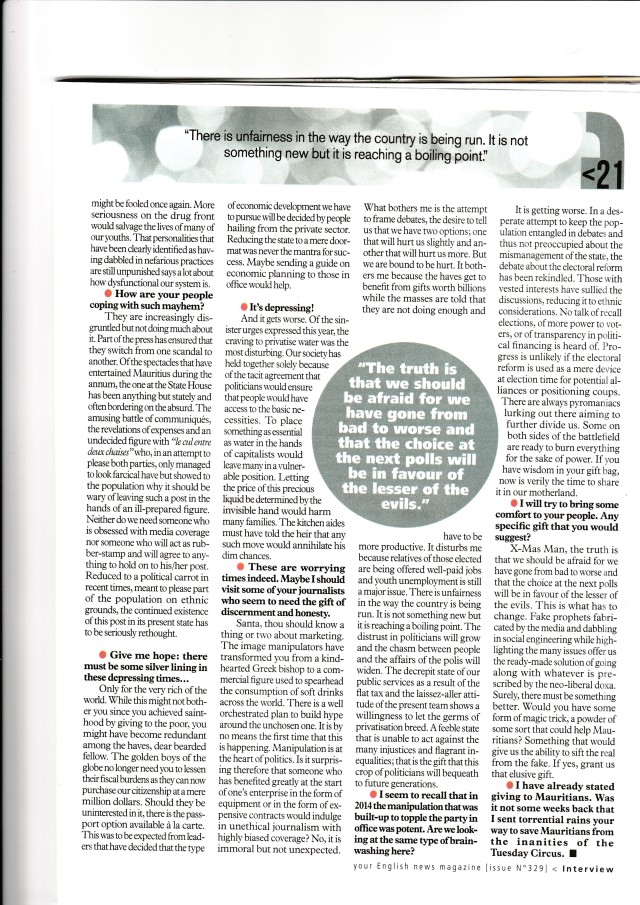
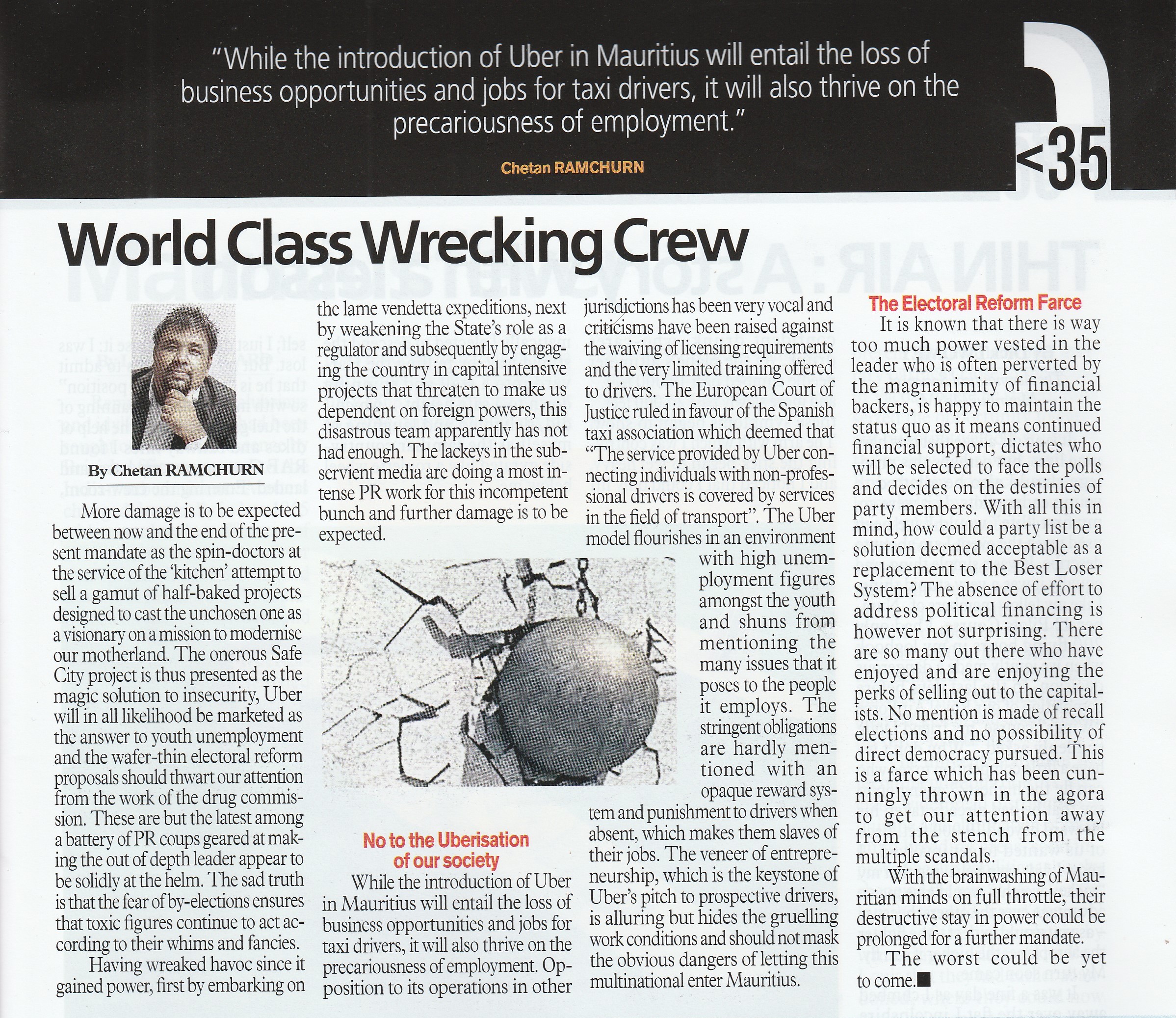





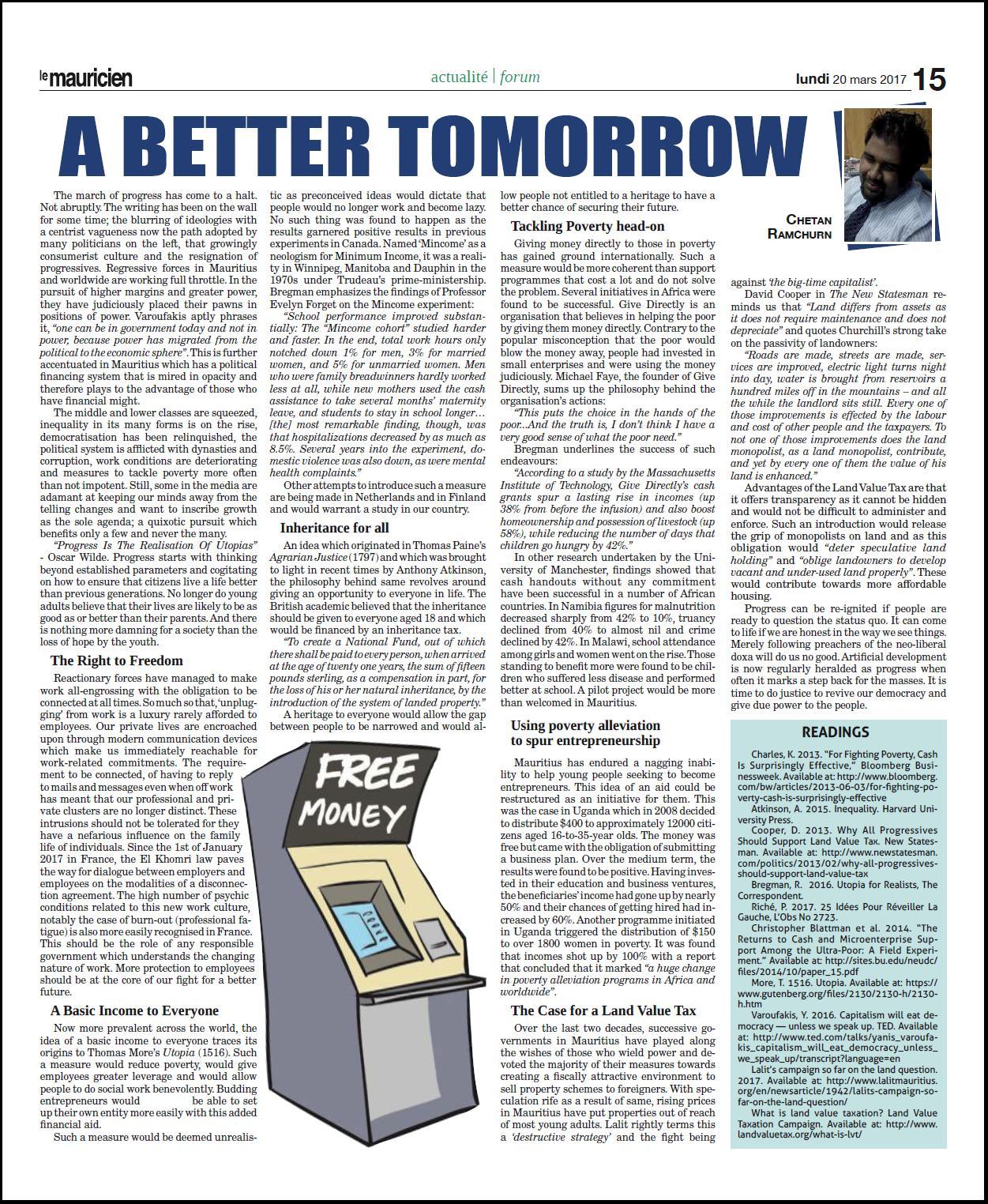
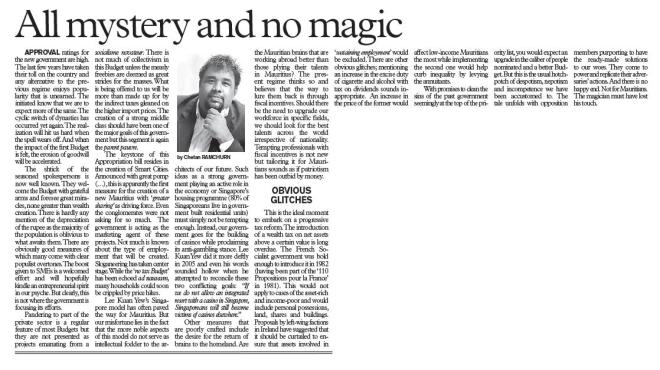





You must be logged in to post a comment.